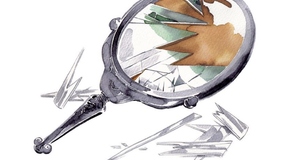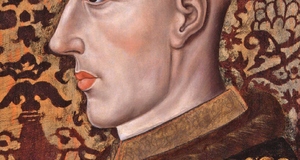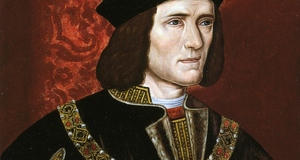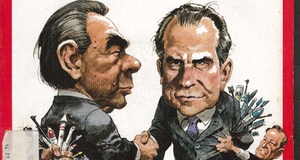The Relationship Between Fathers and Sons in Shakespeare
By
2010, Vol. 2 No. 01 | pg. 1/1
KEYWORDS:
A father’s goal is for his son to surpass him or simply carry on the honor of the family name. To try and avoid any mishaps, fathers advise their sons using the experience they have gained throughout their own lifetimes. The same, it seems, is true of royalty, except that it is not only the family name on the line, but that of the entire country. In William Shakespeares Richard II, the father figures of Gaunt and York, try to persuade Richard to set things straight in England again. Gaunt delivers a speech on his death bed with the hope of convincing Richard to change his ways; York then also tries to reason with the King.In Henry IV, it is Bolingbroke himself that bestows guidance upon his estranged son, Prince Henry, who seems to prefer the company of drunks and thieves to those in the court. His speech, delivered after he finds out about the Percy family rebellion, is intended to get his son to assume his responsibilities in a time of great need. In both plays, the differences between the speeches and how they were received affected the outcome of the story; Nevertheless, the son’s character and what they chose to do with the advice makes an even bigger difference. In Act 2 Scene 1 Richard is on his way to visit his dying uncle, Gaunt. John of Gaunt thinks he can use his condition to his advantage and give his nephew King Richard II advice he will listen to. Gaunt then delivers one of the most famous speeches in the play, foretelling Richard’s demise due to the mistakes he had made: And thus expiring do foretell of him, his rash fierce blaze of riot cannot last,/ For violent fires soon burn out themselves; /Small showers last long, but sudden storms are short; /He tires at betimes that spurs too fast betimes; /With eager feeding food doth choke the feeder: /Light Vanity, insatiate cormorant,/ Consuming means, soon preys upon itself (2.1.32-37). Gaunt is alluding to Richard’s controversial war with Ireland, his greed and vanity that are perpetuated by his many flatterers. Gaunt then tells of his love of England, using the repetition of the word “this” to grab your attention, as well as drive his point home. He describes England as a land fit for kings and of the country’s victories in battle by referring to the Roman god of war, “This earth of majesty, this seat of Mars (2.1.41).” Gaunt even goes as far as to compare England to the biblical garden of Eden, “This other Eden, demi-paradise” (2.1.42). He goes on to tout the island’s fortress like qualities, protecting England from both “infection and the hand of war” (2.1.44). But those very same waters that protect England like a moat does a castle contain the shame of what Richard has done. Richard has allowed England to be rented out “like a tenement or pelting farm (2.1.60)” referring to Richard’s sale of blank charters, which allowed tax collectors to collect however much they wanted on an individual basis. Gaunt refers to the blank charters again, “with inky blots and rotten parchment bonds (2.1.64)” and needless war Richard has involved England in, “That England, that was wont to conquer others, Hath made a shameful conquest of itself” (2.1.65-66). Gaunt predicted that England’s own internal problems would lead to its demise. That particular speech was a complaint given to Richard’s other uncle, York, and not the King himself. York tells him to tone it down for the King, “For young colts being raged do rage the more (2.1.69-70).” Considering the fact that Gaunt is on his death bed, he need not fear any repercussions from Richard, so he chooses not to heed York’s warning. When Richard arrives Gaunt disregards what York told him about toning things down and foretells the King’s death. Richard inquires as to why a man on his own deathbed feels this way. Because Gaunt is ill himself, he feels as though he can see the ill in Richard. As Gaunt lies in his own deathbed, so too does Richard, Gaunt predicts the death of Richard in his own land, with his reputation in the gutter, “They death-bed is no lesser than thy land, wherein thou liest in reputation sick (2.1.95-96).” Gaunt sees Richard as careless, seeking refuge in the very people that put him in this predicament in the first place, his flatterers. His flatterers and close friends were the reason Richard was overtaxing his own people and taking away the birth rights of his nobles. He went against a commonly accepted tradition of sons inheriting their father’s land and title, the very tradition that was the source of his own power, in order to treat these flatterers lavishly. A thousand flatterers are about, all leading him astray. He then goes on to say that Richard's grandfather, Edward III, would have deposed him before he had possessed the throne, but he is now going to depose himself. Gaunt then brings up Richard renting out England to foreigners saying “Landlord of England art thou now, not king” (2.1.113). Richard then cuts him off mid sentence, “A lunatic and lean-witted fool, /presuming on an ague’s privilege, /Darest with thy frozen admonition /make pale our cheek, chasing royal blood /with fury from his native residence” (2.1.115-118). This interjection shows that Richard has no love or respect for his uncle, and shows that he has no intention of listening to what he has to say, despite him being on his deathbed. The fact that Richard says he is using his “ague’s privilege” in order to say these things means that their relationship is clearly strained. Richard does not want to hear any criticism about how he manages the country. Gaunt only wished to give Richard advice based on his life experience, he had seen the rule of Edward III and how clearly it differed from the current situation and wanted England to return to its former glory. Gaunt’s style of parenting clearly differs from York’s, who wanted Gaunt to tread more carefully when addressing Richard. Gaunt’s style even differed when addressing his own son, after he was banished, “Think not the king did banish thee, /but thou the king” (1.3.280). He might not always have disrespected the King, having previously been his regent, but his decision to exile his biological son, Bolingbroke, made him understandably upset. York addresses Richard after Gaunt is taken away, asking the King why he seized Bolingbroke’s birthright. He tries to reason with Richard, trying to use common sense to appeal to the king “Be not thyself; for how art they a king, /But by fair sequence and succession (2.1.198-199)?” York warns him of the dangers of such behaviors, telling Richard that if he does not return Bolingbroke’s birthright, “You pluck a thousand dangers on your head, /You lose a thousand well disposed hearts” (2.1.205-206). York’s attempt at advice is more cautionary than condemning like Gaunt’s. He is very careful to express his loyalty to Richard, or the kingship and divine right, frequently. Richard dismisses York responding, “Think what you will, we seize into our hands, his plate, his goods, his money and his lands” (2.1.209-210). Richard is unwilling to listen to either of his uncles. He doesn’t seem to like Gaunt’s attacks and he is either unable to listen to the reason York tries to off, or unable to take him seriously due to his softness. Richard chose not to heed their warnings and because of this their prophecies were fulfilled. King Henry IV’s advice to Prince Henry is far different in tone. Although he expressed his distaste for his son earlier, saying that “Of my young Harry. Oh, that it could be proved/That some night-tripping fairy had exchanged/In cradle clothes our children where they lay, and called mine Percy, his Plantagenet!”(1.1.85-88), he still seems to care for his son. He expresses his disappointment to his son in a more fatherly fashion, possibly because he is the actual father, unlike Gaunt and York’s relationship with Richard. There is not barrier that exists like Richard’s relationship with his uncles, this is a conversation between a true father and son, even though it is a bit one sided at first while the King gets a few things off of his chest. Imagine how heartbreaking it must have been for Prince Henry when King Henry says “Make me believe that thou art only marked/For the hot vengeance and the rod of heaven /To punish my mistreadings (3.2.9-11).” Henry IV is referring to seizing the crown from Richard, something he appears to feel guilty about. But the Prince, unlike Richard, is able to take this verbal abuse and understand his faults. As far as Richard was concerned, he was appointed by God and could do no wrong. Henry then goes on to question the company Prince Henry keeps: Could such inordinate and low desires, Such poor, such bare, such lewd,, such mean attempts, Such barren pleasures, rude society, As thou art matched and grafted to, Accompany the greatness of thy blood And hold their level with thy princely heart (3.2.12-17)? Henry repeatedly uses the word “such” to emphasize his point, that these people are well below Prince Henry’s status and he should not be associating himself with them. The prince continues to take this battery and waits for his turn to speak, out of respect for his father. Perhaps Prince Henry had gained this thick skin that Richard seemed to lack through his dealings with Falstaff A major difference in the effectiveness of the King’s speech, as compared to that of Richard’s uncles, is the Prince’s receptiveness to what his father has to say. He was willing to accept responsibility for his mistakes and correct them. He had already planned to do so before his father even spoke a word because he knew that he wasn’t living up to his potential and royal stature. It only took a major event, like the threat of rebellion, to get him to change his ways. Hal tells expresses his desire to “Quit all offenses with as clear excuse/ As well I am doubtless I can purge (3.2.19-20)”, making it known that he plans to take his father’s advice seriously. The King pardon’s Hal, but questions his taste in friends, which is “Quite from the flight of all they ancestors (3.2.31)”. It is interesting that Henry IV should say that because despite being from the royal family, he went against his own cousin and stole the crown from the rightful king. He goes on to tell the Prince about how great his own public image is, and how it allowed him to pluck the crown from Richard. His public image is in stark contrast to the Prince, “Not an eye is aweary of thy common sight, Save mine, which hath desired to see thee more (3.2.87-88).” After taking even more punishment Prince Henry again pledges his allegiance to his father, “I shall hereafter, my thrice gracious lord, /Be more myself (3.2.92)”. But the King seems to ignore this, continuing to rattle on about how much of a disappointment his son is, comparing him to Richard as he found him when he returned from exile in France. He says that Hotspur is more worthy of the crown, and that “He hath more worthy interest to the state/Than thou the shadow of succession (3.2.99)”. There is a notable reoccurrence of the word “and” in the King’s speech, as if he were going on and on without pause, listing all of his son’s faults, as well as listing all of the problems plaguing him. Henry IV obviously has a lot on his plate at the moment, including Hotspur, whom he still can’t help but admire. And then King Henry drops a bombshell, “Why, Harry, do I tell thee of my foes, /Which art my nearest and dearest enemy? / Thou art like enough, through vassal fear, /Base inclination, and the start of spleen, / To fight against me under Percy’s pay,” (3.2.122-126), indicating that his own son would be likely to fight against him. The Prince of Wales has waited patiently to speak and it is here that he shows that he is much different in character from Richard II. He responds, “Do not think so. You shall not find it so” (3.2.129). He uses short sentences, to quickly reassure his father. He understands that he was wrong, and pledges to fulfill his royal duty from here on out. Unlike Richard he is able to accept the fact that he has made mistakes and strive to do better. Richard simply ignores what he has done, and continues making mistakes that eventually lead to his “abdication” and death. Prince Henry makes a powerful vow to his father, to set any doubts to rest: This in the name of God I promise here, /The which if He be pleased I shall perform, / I do beseech Your Majesty may salve/ The long-grown wounds of my intemperance. /If not, the end of life cancels all bonds, And I will die a hundred thousand deaths/ Ere break the smallest parcel of this vow. (3.2.153-159) Because of that vow King Henry puts his son in charge of the troops, giving him a chance to redeem himself, which he does by defeating Hotspur in battle. The difference between Richard II and Prince Henry’s fates was partly due to the advice their elders had given them, but a lot of it was determined by their character. Prince Henry was able to accept his faults and act on the advice he was given, whereas Richard’s pride and belief in royal infallibility led to his downfall. Not one of the father figures, York, Gaunt, or King Henry IV, although different in parenting styles, really caused anything to occur that wasn’t going to happen anyway without interference. Richard’s behavior was only going to lead to his failure and his inability to listen or receive criticism had already determined that beforehand. Henry IV’s advice to his son may have brought about his change of heart sooner, but the Prince, who was sincere about making a change and leading England to victory, was likely to assume his role as King and shed his questionable friends no matter what happened. If Richard had listened to his uncles he may have been able to turn the country around, but their advice fell on deaf ears, leading to Richard’s downfall. Prince Henry, who intended to assume his rightful role at some point anyway, was convinced by his father to assume those responsibilities sooner, and because of his willingness, to do so he was able to redeem himself and destroy the rebellion. Shakespeare, William. "The First Part of King Henry the Fourth." The Necessary Shakespeare. Ed. David Bevington. 2nd ed. N.p.: Pearson, n.d. Print. Shakespeare, William. "The Tragedy of King Richard the Second." The Necessary Shakespeare. Ed. David Bevington. 2nd ed. N.p.: Pearson, n.d. Print. Suggested Reading from Inquiries Journal
Inquiries Journal provides undergraduate and graduate students around the world a platform for the wide dissemination of academic work over a range of core disciplines. Representing the work of students from hundreds of institutions around the globe, Inquiries Journal's large database of academic articles is completely free. Learn more | Blog | Submit Latest in Literature |


















